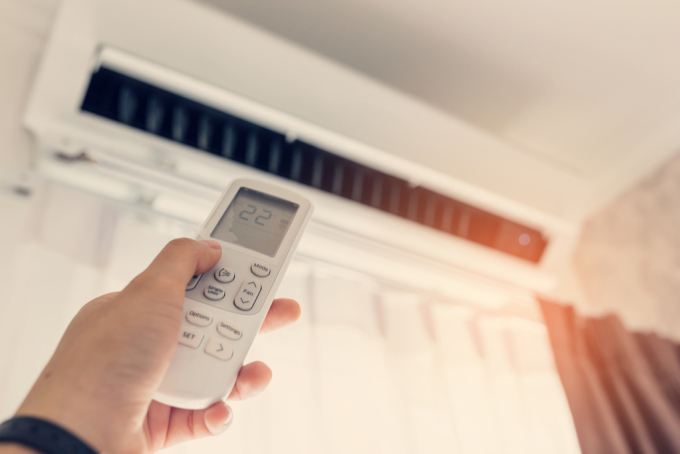When using air conditioning for cooling, it’s best to direct the airflow upwards so that the cold air circulates from top to bottom. Conversely, when heating, adjust the fan downwards. This way, hot and cold air can be maximized and aid in natural air exchange and circulation in the room.
Install at a height of 5.5 feet (1.7 meters)
Air conditioning units are typically installed at a height because cold air has a higher density. So, when the AC unit at this height blows cold air outwards, it will automatically sink and cool the room.
However, it shouldn’t be installed higher than 5.5 feet (1.7 meters) as the cold air, even after undergoing heat exchange, hasn’t sunk and spread out sufficiently, and will be sucked back in, leading to insufficient heat exchange and cooling in the room.

Image: Georgiaairrepair
Draw the curtains
When the AC is on, it’s best to draw the curtains to block out the sunlight and keep the room cooler. Light-colored curtains are preferable as they reflect light, bouncing it back to its source, thus aiding the cooling process.
Set to 78.8°F (26°C) for adults and 82.4°F (28°C) for children
The ideal temperature for air conditioning is 78.8°F (26°C), ensuring a cool and comfortable environment that’s suitable for prolonged periods. Ensure that the temperature difference between indoors and outdoors isn’t too extreme to avoid catching a cold.
However, if there are children in the room, set the temperature to 82.4°F (28°C) as their temperature regulation functions are not yet fully developed, and to prevent them from becoming overly reliant on air conditioning.
Clean the AC unit once a month
If an AC unit is not cleaned for years, it will accumulate dust and harmful bacteria, leading to respiratory infections. Importantly, dust buildup reduces cooling efficiency and increases power consumption. Therefore, it’s essential to clean the AC unit once a month during the summer. In addition to cleaning the mask and filter, use a professional AC disinfectant solution for thorough cleaning.
Turning the AC on and off continuously consumes the most energy
Turning the AC on and off is the easiest way to increase power consumption, especially when starting up, as it can easily damage the compressor. The correct way is to set a low temperature to cool the room as quickly as possible. Once the desired temperature is reached, adjust the temperature upwards and reduce the fan speed.
Use the timer function
You don’t need to keep the AC running all night. Typically, 2-3 hours at the beginning of your sleep is sufficient, after which you can switch to a fan. If you’re still concerned about the temperature, you can also set the AC to sleep mode at night to save up to 20% energy.
Keep the door open when turning on the AC
The air in a closed room with the AC running can be 2-5 times more harmful than outdoors, negatively affecting your health. Staying in a closed room for too long can increase feelings of suffocation and difficulty breathing. The correct way to use the AC is to let it run for 10 minutes with the door open. This way, during the AC’s operation, some dust and bacteria will be expelled, allowing fresh air to enter the room.
At the same time, ventilate the AC room three times a day – morning, afternoon, and evening.
Place a bucket of water
The AC will absorb moisture from the room, making the air dry, which can cause dryness in the mouth, nose, and eyes. Placing a bucket of water in the room can help alleviate these symptoms.
Place oxygen-rich plants
In a room with the AC running, if the windows are often closed and the air isn’t circulated, place oxygen-rich plants like orchids, asparagus ferns, or peace lilies. These plants not only release large amounts of oxygen but also purify the air, making the room fresher and cooler.
Limit the use of AC when sleeping on mats
For those with spinal degeneration, cold shoulders, or joint pain, sleeping on mats in a cold room can trigger a recurrence of old ailments. Those with digestive issues or a fear of catching a cold may also experience stomachaches and diarrhea when sleeping on mats in a cold room. Therefore, it’s best to limit the use of AC when sleeping on mats or switch to using a mattress.





































